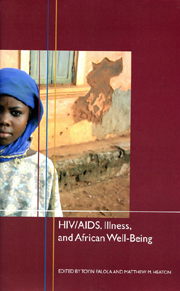Book contents
- Frontmatter
- Contents
- Acknowledgments
- Part I Context
- Part II Illness Case Studies
- Part III Globalization, Development, and Health
- 7 The Microbial Rebellion: Trends and Containment of Antimicrobial Resistance in Africa
- 8 Development and the Epidemiologic Transition in Sub-Saharan Africa
- 9 The Economic Burden of Buruli Ulcer Disease on Households in Rural Ghana
- 10 Health Issues in a Mining Community in South Africa
- 11 Globalization, Health, and the Hajj: The West African Pilgrimage Scheme, 1919–38
- Part IV HIV/AIDS
- List of Contributors
- Index
- Rochester Studies in African History and the Diaspora
8 - Development and the Epidemiologic Transition in Sub-Saharan Africa
from Part III - Globalization, Development, and Health
Published online by Cambridge University Press: 05 February 2013
- Frontmatter
- Contents
- Acknowledgments
- Part I Context
- Part II Illness Case Studies
- Part III Globalization, Development, and Health
- 7 The Microbial Rebellion: Trends and Containment of Antimicrobial Resistance in Africa
- 8 Development and the Epidemiologic Transition in Sub-Saharan Africa
- 9 The Economic Burden of Buruli Ulcer Disease on Households in Rural Ghana
- 10 Health Issues in a Mining Community in South Africa
- 11 Globalization, Health, and the Hajj: The West African Pilgrimage Scheme, 1919–38
- Part IV HIV/AIDS
- List of Contributors
- Index
- Rochester Studies in African History and the Diaspora
Summary
Dr. Jeffrey Sach's recent United Nations report, “Investing in Development: A Practical Plan to Achieve the Millennium Development Goals,” has brought renewed discussion on the role of economic development in reducing poverty and improving health in the developing world. While much of the public debate in developed countries has focused on the amount of aid and the implementation of this proposal, there has been limited discussion on the role economic development has already played and continues to play in the improvement of health in developing countries. Increases in the GNP (gross national product), a key indicator of economic growth, are associated with an increased life expectancy at birth (figure 8.1) because of increased nutrition and decreased deaths due to infectious and parasitic diseases. Childhood immunization programs and water development projects have also played significant roles in improving child health. As people survive to older ages, the main causes of death are typically chronic and noncommunicable conditions such as heart disease and stroke. This shift in the burden of disease from infectious diseases to chronic conditions is called the “epidemiologic transition.” Developing countries' health systems are frequently ill equipped to manage the new health concerns that arise during this transition, especially those in countries that continue to face high rates of infectious disease.
Rather than following the “classic” pattern of epidemiologic transition, sub-Saharan Africa is facing what some have dubbed the “double burden” of disease because economic development is leading to an increasingly significant burden from chronic diseases while the rate of morbidity and mortality from infectious agents remains high.
- Type
- Chapter
- Information
- HIV/AIDS, Illness, and African Well-Being , pp. 182 - 198Publisher: Boydell & BrewerPrint publication year: 2007



